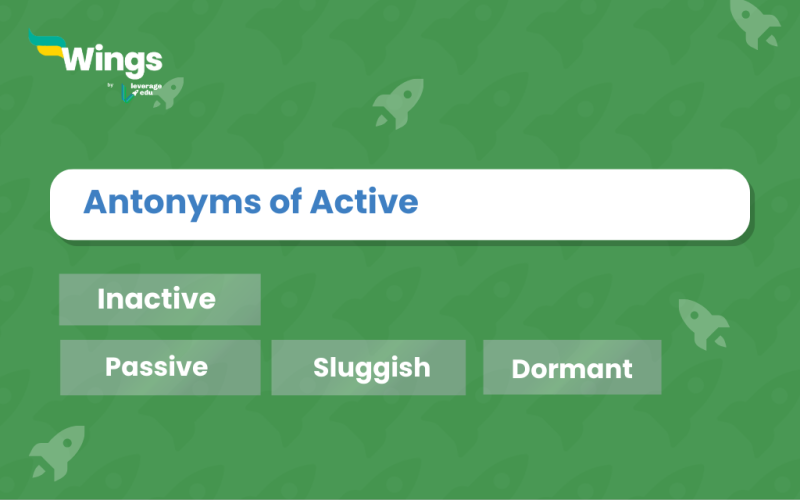The antonyms of “Active” are Inactive, Passive, Dormant, Sluggish or Idle. To make an impression and get well-versed in vocabulary one should know at least a few antonyms of general words like “Active.”
“Active” is a word that is regularly used in general day-to-day communication. We come across this word at least once a day. Not just this we also use its antonyms quite frequently.
Meaning of Active
“Active” is a word that is used in everyday conversation. However, to make things simpler for you we will explain the meaning of this word in short.
“Active” refers to a state of being engaged in action, movement, or physical and mental activity.
9+ Opposites of Active
Mentioned below are some words that can be used as antonyms to the word active:
- Inactive
- Passive
- Dormant
- Sluggish
- Idle
- Lethargic
- Motionless
- Resting
- Quiet
- Still
Also Read: 300+ Antonyms
Usage with Examples
Given below are some examples of how the antonyms of “active” can be used in a sentence:
- Inactive – Not engaged in action or lacking activity.Example: After a long day at work, he prefers to spend his evenings in an inactive state, relaxing on the couch.
- Passive – Showing little or no resistance, often indicating a lack of initiative or action.Example: Her passive approach to the project meant that she rarely contributed any new ideas.
- Dormant – In a state of rest or inactivity, often used to describe things that are temporarily inactive.Example: The volcano had been dormant for centuries, but scientists were monitoring it closely.
- Sluggish – Lacking energy or slow to respond, typically referring to a lack of physical or mental activity.Example: The hot weather made everyone feel sluggish and less productive.
- Idle – Not in use or not engaged in any activity.Example: The factory had to lay off workers due to the idle machinery and reduced demand for products.
- Lethargic – Lacking energy, enthusiasm, or motivation.Example: After a heavy meal, he felt lethargic and struggled to stay awake during the meeting.
- Motionless – Completely still or without any movement.Example: The deer remained motionless in the forest, trying to blend in with its surroundings.
- Resting – Taking a break from physical or mental exertion.Example: After a strenuous workout, it’s essential to spend some time resting to allow the body to recover.
- Quiet – Characterized by a lack of noise or commotion, often indicating a calm and tranquil state.Example: The library was so quiet that you could hear a pin drop.
- Still – Completely devoid of motion or activity.Example: The pond’s surface was so still that it perfectly reflected the surrounding trees and sky.
Also Read: Antonyms of Misogyny with Meaning and Examples
Antonyms of Active Quiz
Question 1: After a long day at work, she prefers to spend her evenings in an _______ state, relaxing on the couch.
A) Active B) Dormant C) Lively D) Energetic
Question 2: The factory had to lay off workers due to the _______ machinery and reduced demand for products.
A) Active B) Idle C) Vigorous D) Animated
Answers:
- B) Dormant
- B) Idle
This was all about the antonym of active” meaning and examples. Hope you understood the concept where it’s used. For more such blogs, follow Leverage Edu.
 One app for all your study abroad needs
One app for all your study abroad needs














 45,000+ students realised their study abroad dream with us. Take the first step today.
45,000+ students realised their study abroad dream with us. Take the first step today.

